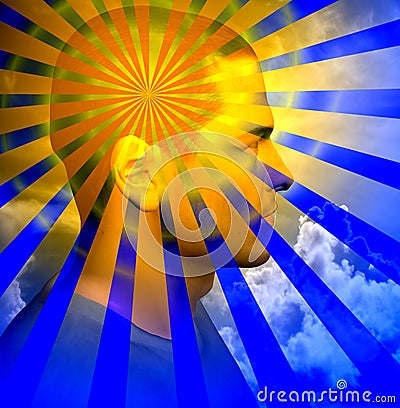Question : (Unedited)
I was recently reading a translation of the dhammapada online that included stories from which the verses are supposed to have originated, and I was only into the second story when I noticed something that puzzled me. It was the story of Matthakundali who sees the Buddha just before dying, mentally professes his faith in him, and is thus reborn as semi-/demi-/god. Like the Buddha’s disciples I’m confused as to why this should be. As a westerner who likes to see logic and reason behind the world, I’m puzzled to see an instance suggesting that salvation can be achieved by faith in Buddhism rather than human effort. One of the crucial elements that first lead me to reject Christianity and attracted me to Buddhism was a lack of faith in deity/superstition/mythology. Am I interpreting this story correctly in thinking it suggests there is room for saving faith in Buddhism? I’ve always understood the Buddha to be human rather than a supernatural being; is this incorrect?
Related to this is the whole idea of the fantastic stories surrounding the Buddha: his preaching from a cloud, the bowl flowing upstream, his seemingly miraculous birth, to name a few. I’ve never taken such stories at face value, personally, choosing instead to understand them as figurative and metaphorical and not necessary (indeed, perhaps a hindrance) to practicing Buddhism. Is this approach greatly flawed?
My comment:
Hi J....,
Thank you for asking me.
Just as there are so many types of people, there are also variations in one's belief, perception, and interpretation. Before we proceed to discuss your comments and questions, we must first establish the fundamental teachings of the Buddha. I am sure you are familiar with these fundamental concepts. They alone form the basic foundation of the Buddha's teachings. These fundamental teachings are the Four Noble Truths, the Noble Eightfold Path, the Three Characteristics of Existence, the Law of Cause and Effect, and the Three Evil Roots of Greed, Hatred and Delusion. The rest are merely additions, legends, beliefs, and elaborations which may or may not be true. It is up to our wise judgement to decide which is beneficial and which is not.
The Dhammapada is a collection of stories with moral messages. The essence of the moral messages are more important than the authenticity of these stories. We must also bear in mind that the Buddha is no ordinary mortal. Many things which our ancestors insisted cannot be true or to be impossible are now proven to be true and possible. So it is wiser not to completely reject everything just because we think impossible. We must also understand that the events related did not happen in one life time, but were the final results of accumulated events of numerous past lives. If you study more of the Buddha's life, there will be more "fantastic" stories, events, and personal relationships with those associated with him. All these people did not just associate with the Buddha by chance. They were already with him during previous life-time.
<< As a westerner who likes to see logic and reason behind the world>>
This is the greatest flaw in humans believing that one can reason with everything through logic. One has to understand that the physical faculties have serious limitations. Our eyes can only see that far or that size. Anything farther or smaller, we cannot see anymore. The same goes with our hearing, sense of smell, sense of touch, taste, and ability to compute. Our brain also has serious limitations, otherwise all of us will be smarter than Einstein! The Buddha had acquired an extraordinary power not available through the five physical senses. It is the power of the mind, which an average Westerner is so grossly ignorant of. This supreme power of the mind is what set the Buddha aloft from the others. The power of the mind is the epitome of human achievement.
***************************************
Below are the pali version with English translation of the first two verses of the Dhammapada. In these two verses, you may find answers to all life's adventures and tragedies.
Dhammapada Verse 1
Cakkhupalatthera Vatthu :
Manopubbangama dhamma
manosettha manomaya
manasa ce padutthena
bhasati va karoti va
tato nam dukkhamanveti
cakkamva vahato padam.
Verse 1. Suffering Follows The Evil-Doer
Mind precedes all knowables,
mind's their chief, mind-made are they.
If with a corrupted mind
one should either speak or act
dukkha (Suffering/Unsatisfactriness) follows caused by that,
as does the wheel that follows the ox's hoof.
Explanation: All that we experience begins with thought. Our words and deeds spring from thought. If we speak or act with evil thoughts, unpleasant circumstances and experiences inevitably result. Wherever we go, we create bad circumstances because we carry bad thoughts. This is very much like the wheel of a cart following the hoofs of the ox yoked to the cart. The cart-wheel, along with the heavy load of the cart, keeps following the draught oxen. The animal is bound to this heavy load and cannot leave it.
Dhammapada Verse 2
Matthakundali Vatthu :
Manopubbangama dhamma
manosettha manomaya
manasa ce pasannena
bhasati va karoti va
tato nam sukha manveti
chayava anapayini.
Verse 2. Happiness Follows The Doer of Good
Mind precedes all knowables,
mind's their chief, mind-made are they.
If with a clear, and confident mind
one should speak and act,
happiness follows one,
as one's shadow never departing.
Explanation: All that man experiences springs out of his thoughts. If his thoughts are good, the words and the deeds will also be good. The result of good thoughts , words and deeds will be happiness. This happiness will never leave the person whose thoughts are good. Happiness will always follow him like his shadow that never leaves him.

















